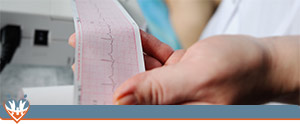Long QT Syndrome Treatment Specialist in Reseda, CA
Long QT syndrome can lead to several serious complications if not properly managed. Early diagnosis can facilitate swift treatment interventions and help in the patient’s management of the condition. Long QT syndrome treatment is available at Rachman Medical Group. For more information, contact us today or request an appointment online now! We are conveniently located at 7601 Canby Ave Suite 7 Reseda, CA 91335.


Table of Contents:
What is long QT syndrome?
What does a long QT episode feel like?
What are the complications associated with long QT syndrome?
What triggers long QT syndrome?
How is long QT syndrome diagnosed?
Long QT syndrome is a health condition that influences the heart’s electrical system, leading to an abnormal heart rhythm. This abnormal heart rate is associated with longer than normal intervals between beats during which the heart recharges.
Long QT syndrome is capable of causing fast and irregular heartbeats which might lead to serious health issues like fainting, seizures, or even sudden cardiac arrest. Some people are born with the syndrome while others develop it later in life due to certain medications or health conditions.
The extended time between beats is represented by the QT interval on an electrocardiogram (ECG). The QT interval is a portion of the ECG report that indicates the speed at which the heart’s muscles contract and then recover.
Because the heart’s electrical system is failing to function properly, individuals with Long QT syndrome can experience sudden episodes of arrhythmias which can be a life-threatening concern.
There is some variation in what a long QT episode feels like depending on its severity and other health factors. During the episode’s onset individuals will often observe sensations like light headedness, heart palpitations, or a fluttering feeling in the chest.
These sensations come from the irregular and rapid heartbeats that characterize the syndrome. As the episode progresses, it can lead to fainting, which occurs when the heart beats in a disordered way for a short period, reducing blood flow to the brain.
Individuals might also feel dizzy or weak just before losing consciousness. In addition to fainting, some individuals might experience seizures during a long QT episode.
These seizures happen because the altered heartbeats can disrupt normal brain function. The episodes can occur without much, or sometimes any, warning, often triggered by physical activity, emotional stress, or sudden loud noises.
Long QT syndrome can lead to several serious complications if not properly managed. One of the most severe complications is torsade de pointes, a specific type of life-threatening arrhythmia that can cause the heart to stop beating effectively, leading to sudden cardiac arrest.
Frequent episodes of fainting can also significantly impact an individual’s quality of life, causing anxiety and limiting daily activities. The psychological impact of living with Long QT syndrome, including the constant fear of an episode, can have a toll as well and ultimately, affect mental health, contributing to stress and anxiety disorders. Another complication is the increased risk of developing other heart-related issues over time.
Long QT syndrome can be triggered by various factors, depending on whether the condition is congenital or acquired. For those with congenital Long QT syndrome, episodes are often triggered by physical exertion, emotional stress, or sudden loud noises.
These triggers can cause a rapid, chaotic heart rhythm that leads to fainting or seizures. In acquired Long QT syndrome, triggers typically include certain medications and electrolyte imbalances.
Medications such as some antibiotics, antifungals, and heart rhythm drugs can prolong the QT interval. Low levels of potassium, magnesium, as well as calcium can also trigger an episode.
Diagnosing Long QT syndrome involves several steps, including an electrocardiogram (ECG) to measure the QT interval. A QT interval longer than average, typically of 450 milliseconds or longer, can potentially indicate long QT syndrome.
Providers at Rachman Medical Group will review the patient’s medical and family history, looking for instances of fainting, seizures, or sudden cardiac arrest. Additional tests may be utilized to confirm a diagnosis of long QT syndrome such as blood tests and genetic tests.
In some cases, providers will suggest ambulatory monitors or exercise stress tests as well. These tests help determine the type and cause of Long QT syndrome, guiding effective treatment plans. Early diagnosis can facilitate swift treatment interventions and help in the patient’s management of the condition.
Long QT syndrome treatment is available at Rachman Medical Group. Visit us online now to check out our services and to sign up for our special offers – you will be glad you did! We serve patients from Reseda CA, San Fernando CA, Twin Lakes CA, Hidden Hills CA, Burbank CA, and BEYOND!

Additional Services You May Like
▸ Primary Care
▸ Medicare
▸ Diabetes
▸ Hypertension
▸ Medicare Advantage Primary Care
▸ Internal Medicine
▸ Management of Chronic Conditions
▸ Primary Care for Medicare Patients
▸ Type 1 Diabetes
▸ Type 2 Diabetes

Additional Services You May Like
▸ Primary Care
▸ Medicare
▸ Diabetes
▸ Hypertension
▸ Medicare Advantage Primary Care
▸ Internal Medicine
▸ Management of Chronic Conditions
▸ Primary Care for Medicare Patients
▸ Type 1 Diabetes
▸ Type 2 Diabetes





